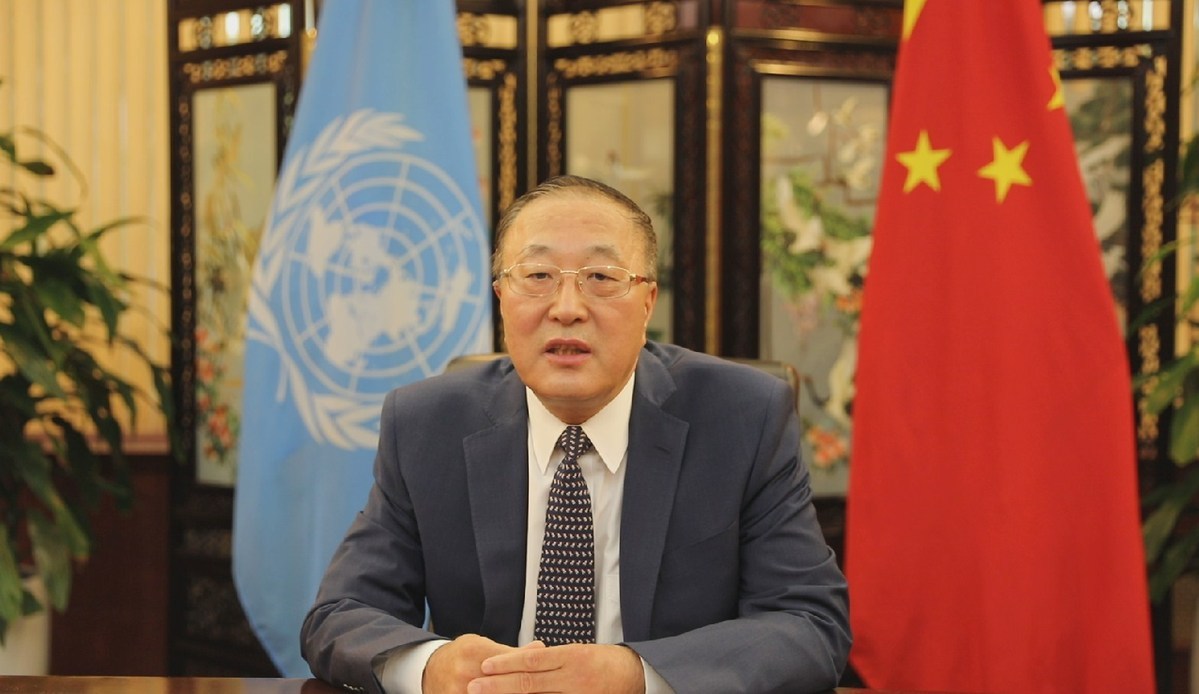
Zhang Jun, China's permanent representative to the UN. (Photo: Xinhua)
China's top envoy to the United Nations, addressing the Security Council, stressed that solidarity and cooperation are the most powerful weapons in the global fight against COVID-19, especially in conflict-affected countries.
Zhang Jun, China's permanent representative to the UN, spoke Wednesday during high-level open debate in the Security Council on the challenges to achieving sustainable peace as the novel coronavirus pandemic ravages communities worldwide.
At the meeting, UN Secretary-General Antonio Guterres reminded the council that COVID-19 threatens not only hard-won developmental and peace-building gains but also "risks exacerbating conflicts or fomenting new ones".
Against the backdrop of growing questions over the effectiveness of health systems and trust in institutions and governance across the globe, Guterres said, "All of this means that our commitment to sustaining peace is more urgent than ever."
Zhang echoed Guterres' call, saying, "We must step up our efforts to prevail over the pandemic and build back better at an early date.
"China calls on all parties to conflict to respond to the secretary-general's appeal for a global cease-fire as soon as possible, not only to lay down their arms and silence the guns but also to coordinate actions against COVID-19," Zhang said.
"We should support the UN and the WHO (World Health Organization) in mobilizing countries to further strengthen policy coordination and increase resources to help with the preparation and response of the conflict-affected countries," Zhang stressed.
Zhang pointed out that "unilateral sanctions are seriously undermining the basic capacity of targeted countries in responding to the pandemic and safeguarding livelihoods, making innocent civilians the biggest victims".
"We once again strongly urge relevant countries to acknowledge the negative humanitarian consequences and immediately lift their unilateral coercive measures," Zhang said.
Since the coronavirus outbreak, Zhang said China has been actively engaged in the global fight. China has been doing its utmost to support and assist countries in need.
Zhang highlighted that in June, Chinese President Xi Jinping chaired the China-Africa Summit on Solidarity Against COVID-19, which he believes demonstrated the determination of China and Africa to fight the disease together. Additionally, China said it had decided to cancel the debt of interest-free loans to relevant African countries due by the end of 2020.
China also announced that coronavirus vaccine development and deployment in China, when available, will be made a global public good.
China is ready to continue providing medical supplies to affected countries, share experience in diagnosis and treatment and send medical experts to assist the countries' response, according to Zhang.
Zhang said the world needs to better understand the challenges of sustaining peace and strengthening current approaches to promoting peace.
Zhang underlined that in the process of peace building, countries should always be people-centered, promote sustaining peace through development and strengthen political leadership and participation of the whole society.
Zhang said there is no doubt that the pandemic has brought tremendous impact and challenges to the world. However, "we have every reason to believe that humankind will eventually prevail and make the world a better place", he said.
"To make that happen, we must be united and uphold multilateralism," Zhang added.
Zhang said that countries are dependent on each other and have a shared future. "No one can artificially sever the ties that connect us," he said.
"Unilateralism is a one-way train heading to a dead end, and there is no other option but turning back," he said, adding that countries should give stronger support to the UN to better meet challenges and pursue common development through multilateral cooperation.
To make that happen, Zhang said, "we must uphold justice and the rule of law. Justice is the hope of all and is rooted in the hearts of the people."
Zhang said international law and the norms of international relations are important guarantees for fairness and justice. All countries should honor their commitments and fulfill due responsibilities and obligations, he said.
"We cannot allow the practice of power politics, bullying and exceptionalism to take the world back to an age of the jungle," he said.
Zhang said "we must respect science, and support technological progress".
The ambassador said advances in science and technology are the common pursuit of humankind, because everyone is entitled to a better life, including those in developing countries.
"The practice of putting up artificial barriers to hinder other countries' scientific and technological development and to interfere with market competition for selfish gains is immoral, irresponsible and against one's own interest," he said.
At the meeting, Guterres said: "COVID-19 is a human tragedy — but we can mitigate the impacts by the choices we make. Multidimensional, coordinated and conflict-sensitive responses and whole-of-society approaches are crucial."
Said Zhang: "It is our sincere hope that UN members and the international community will act together, shoulder responsibilities together, share the benefits together and jointly build a better future for all."


